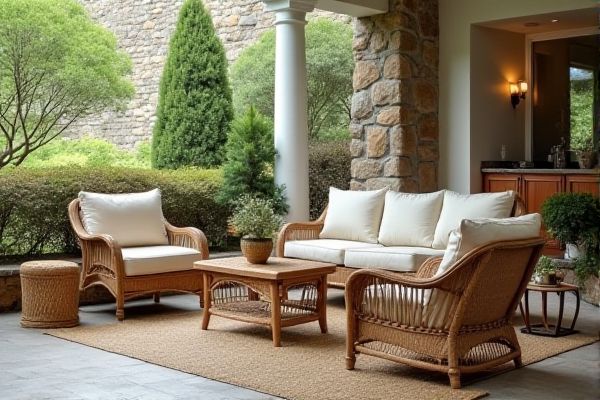
Resin wicker furniture offers superior durability, weather resistance, and low maintenance compared to natural wicker, which provides a more authentic, classic aesthetic but requires careful upkeep to prevent damage from moisture and sunlight. Discover the key differences to choose the perfect option for Your outdoor or indoor space by reading the rest of the article.
Table of Comparison
| Feature | Resin Wicker Furniture | Natural Wicker Furniture |
|---|---|---|
| Material | Synthetic resin (PE, PVC) | Natural plant fibers (rattan, bamboo, willow) |
| Durability | Highly durable, weather-resistant, UV-resistant | Less durable, prone to damage from moisture and sunlight |
| Maintenance | Low maintenance, easy to clean with water and mild soap | Requires regular cleaning and protection from moisture |
| Weight | Lightweight yet sturdy | Light but can be fragile |
| Appearance | Synthetic, can mimic natural wicker closely, available in many colors | Authentic natural texture and look |
| Cost | Moderate to high, depending on quality | Generally lower cost but varies by fiber type |
| Sustainability | Non-biodegradable, but recyclable | Biodegradable, renewable resource |
| Ideal Use | Outdoor furniture, all weather conditions | Indoor or covered outdoor use |
Introduction to Resin Wicker and Natural Wicker Furniture
Resin wicker furniture, made from synthetic polyethylene fibers, offers superior durability, UV resistance, and moisture-proof qualities, making it ideal for outdoor use. Natural wicker furniture, crafted from organic materials like rattan, willow, or bamboo, provides a classic aesthetic with lightweight and breathable construction but requires more maintenance due to susceptibility to weather damage. Choosing between resin and natural wicker hinges on priorities such as longevity, maintenance, and environmental exposure.
Key Material Differences
Resin wicker furniture is made from synthetic polyethylene fibers designed to withstand outdoor conditions, offering superior durability and resistance to moisture, UV rays, and mildew compared to natural wicker, which is crafted from organic plant materials like rattan or bamboo. Natural wicker provides a classic, authentic aesthetic and is biodegradable but tends to deteriorate faster when exposed to weather elements, requiring more maintenance to prevent cracking and fading. Understanding these key material differences helps you choose furniture that balances style, longevity, and environmental factors for your space.
Durability and Weather Resistance
Resin wicker furniture offers superior durability and weather resistance compared to natural wicker, as it is made from synthetic materials that resist fading, cracking, and moisture damage. Natural wicker, crafted from plant fibers, tends to deteriorate faster when exposed to rain, UV rays, and humidity, requiring more maintenance and protection. For outdoor furniture, resin wicker is preferred due to its long-lasting performance in diverse climates without warping or mildew growth.
Maintenance and Cleaning Requirements
Resin wicker furniture requires minimal maintenance due to its synthetic composition, which resists moisture, fading, and mildew, making it ideal for outdoor use with simple cleaning involving mild soap and water. Natural wicker furniture demands more frequent care to prevent damage from humidity and sun exposure, including regular dusting and occasional sealing to protect the organic fibers from cracking and mold growth. Choosing resin wicker reduces the need for intensive upkeep, while natural wicker offers classic aesthetics but requires diligent preservation efforts to maintain longevity.
Appearance and Design Variations
Resin wicker furniture offers a sleek, uniform appearance with consistent color and texture, ideal for modern outdoor spaces. Natural wicker provides a rich, organic look featuring unique patterns and subtle variations that highlight handcrafted artistry. Your choice depends on whether you prefer contemporary durability or the authentic, rustic charm of traditional design.
Comfort and Usability
Resin wicker furniture offers superior comfort due to its flexibility and weather-resistant cushioning, making it ideal for outdoor use in various climates. Natural wicker, while aesthetically pleasing and breathable, can become brittle and less comfortable over time when exposed to moisture and sunlight. Resin wicker's durability and low maintenance enhance usability, allowing for frequent use without compromising comfort or structural integrity.
Environmental Impact and Sustainability
Resin wicker furniture offers greater environmental sustainability due to its durability and resistance to weather, reducing the need for frequent replacements and minimizing waste. Natural wicker, often made from rattan or bamboo, is biodegradable and sourced from renewable plants, but its production can contribute to deforestation if not managed sustainably. Choosing resin wicker made from recycled materials or natural wicker certified by sustainability programs supports eco-friendly furniture choices.
Cost Comparison: Resin vs. Natural Wicker
Resin wicker furniture typically costs 20% to 40% more than natural wicker due to its durability and weather-resistant properties. Natural wicker furniture, made from materials like rattan or bamboo, is generally less expensive but requires more maintenance and is prone to damage from moisture and sunlight. Buyers seeking long-term value often invest in resin wicker despite the higher upfront price, as it reduces replacement and repair costs over time.
Best Applications and Ideal Settings
Resin wicker furniture excels in outdoor settings such as patios, poolside areas, and gardens due to its weather-resistant, UV-protected, and low-maintenance properties. Natural wicker furniture is best suited for indoor environments like sunrooms, conservatories, or covered porches where humidity and exposure to sunlight are controlled, preserving its organic texture and warmth. Choosing resin wicker for high-traffic and exposed locations ensures durability, while natural wicker enhances cozy, shaded spaces with its traditional aesthetic, making your furniture selection perfectly aligned with its ideal applications.
Final Verdict: Choosing the Right Wicker Furniture
Resin wicker furniture offers superior durability and weather resistance, making it ideal for outdoor settings where exposure to moisture and UV rays is frequent. Natural wicker, crafted from plant fibers like rattan or bamboo, provides an authentic, organic aesthetic but requires more maintenance to prevent damage and prolong its lifespan. Your choice depends on whether you prioritize low-maintenance, long-lasting outdoor use with resin wicker or the traditional, handcrafted appeal of natural wicker for covered or indoor spaces.
 homyna.com
homyna.com